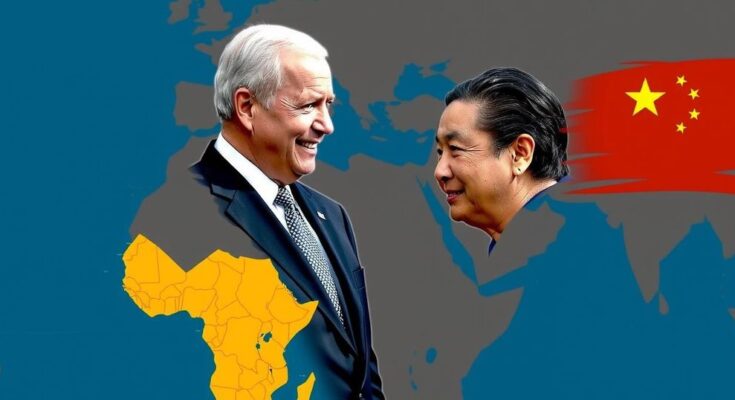President Biden’s upcoming trip to Angola focuses on the Lobito Atlantic Railway, a U.S.-backed initiative aimed at reducing reliance on Chinese mineral exports from the Democratic Republic of Congo. The project symbolizes a renewed U.S. interest in Africa, seeking to enhance infrastructure while countering Chinese influence. Biden’s visit highlights historical relations and future potential, despite skepticism regarding project viability and effectiveness.
President Joe Biden embarks on a significant trip to Angola, commencing on Sunday, as part of his commitment to strengthen relations with Africa. The focus is prominently placed on the Lobito Atlantic Railway (LAR), a U.S.-funded initiative aimed at redirecting critical mineral resources from the Democratic Republic of Congo (DRC) and Zambia to the Lobito port in Angola. This measure seeks to enhance U.S. influence in a region increasingly dominated by Chinese interests, particularly concerning crucial minerals like copper and cobalt, essential for various high-tech applications. China’s recent agreement with Tanzania and Zambia to revitalize a competing railway highlights the urgency of Biden’s initiative.
While this diplomatic endeavor occurs at a pivotal time in Biden’s presidency, insight suggests potential changes in the U.S.-Angola dynamic regardless of the administration’s political shifts. Former officials from Donald Trump’s administration indicate that Trump may continue to prioritize U.S. engagement in Africa, particularly concerning competition against China and Russia, thus ensuring the continuity of such projects like LAR. Biden’s two-day visit also includes a symbolic stop at a slavery museum in Luanda, underlining the importance of historical context in current engagements.
Despite the historical complexities between the U.S. and Angola, highlighting past rivalries during Angola’s civil war, this trip signals a renewed effort to engage with Angola, which increasingly seeks partnerships that encourage economic growth. Moreover, officials from Angola have expressed that their interest is in collaborating with partners who advance their development goals.
Regarding the Lobito rail initiative, U.S. officials assert that it represents more than a single endeavor; it is an experimental model for public-private partnerships intended to foster future infrastructure projects across Africa. Nonetheless, skepticism surrounds the project’s viability and its connection to broader regional networks, particularly a second phase that may link to eastern Africa, and concerns remain as to how effectively the project can counterbalance China’s substantial influence in the region.
In recent years, the geopolitical landscape in Africa has drawn the attention of global powers, particularly the United States and China. As competition for resources escalates, critical minerals such as copper and cobalt, predominantly found in the DRC, have become pivotal in shaping international relations. With significant investments and partnerships, China has established a dominant position, prompting the U.S. to seek strategies to enhance its influence in the region. Biden’s upcoming trip to Angola focuses on a key railway project, aimed at improving infrastructure while reducing reliance on Chinese exports. This visit underlines a broader context of U.S. interests in Africa, amidst challenges and historical relations that impact current diplomacy.
President Biden’s trip to Angola marks a significant step in U.S. diplomatic relations with Africa, underscoring the strategic importance of critical mineral resources in global geopolitics. The Lobito Atlantic Railway serves as a symbol of the U.S.’s commitment to enhancing infrastructure and countering China’s growing influence. Despite challenges and doubts regarding the project’s effectiveness and timeline, the initiative reflects a renewed focus on strengthening ties with African nations for mutual benefit and economic advancement. The evolving dynamics in U.S.-Angola relations may set a precedent for future partnerships in the region, underscoring the enduring significance of collaborative efforts in addressing shared concerns about resource management and security.
Original Source: www.usnews.com




